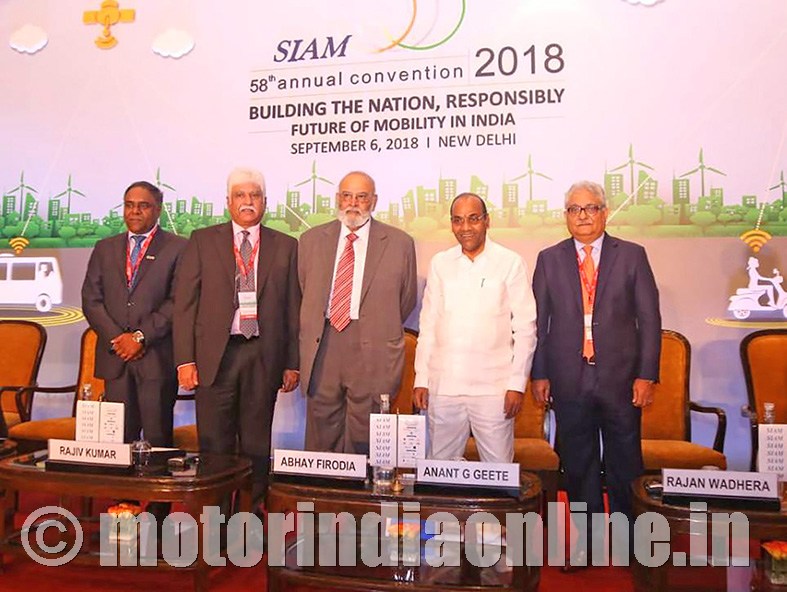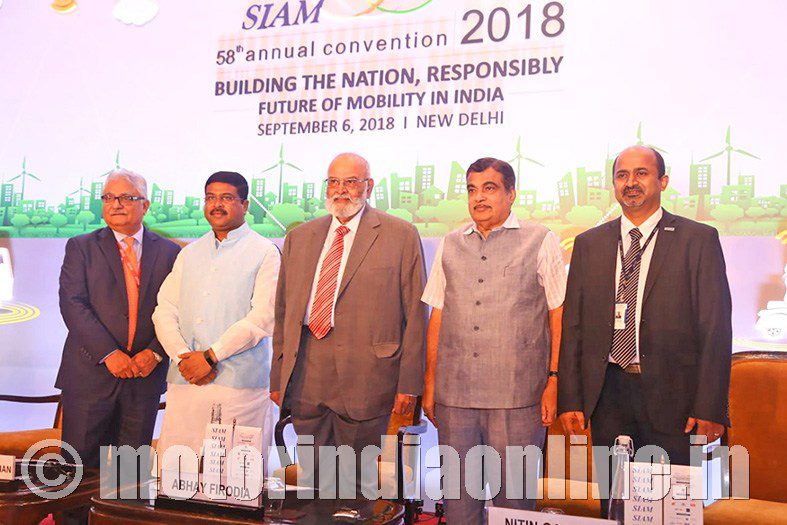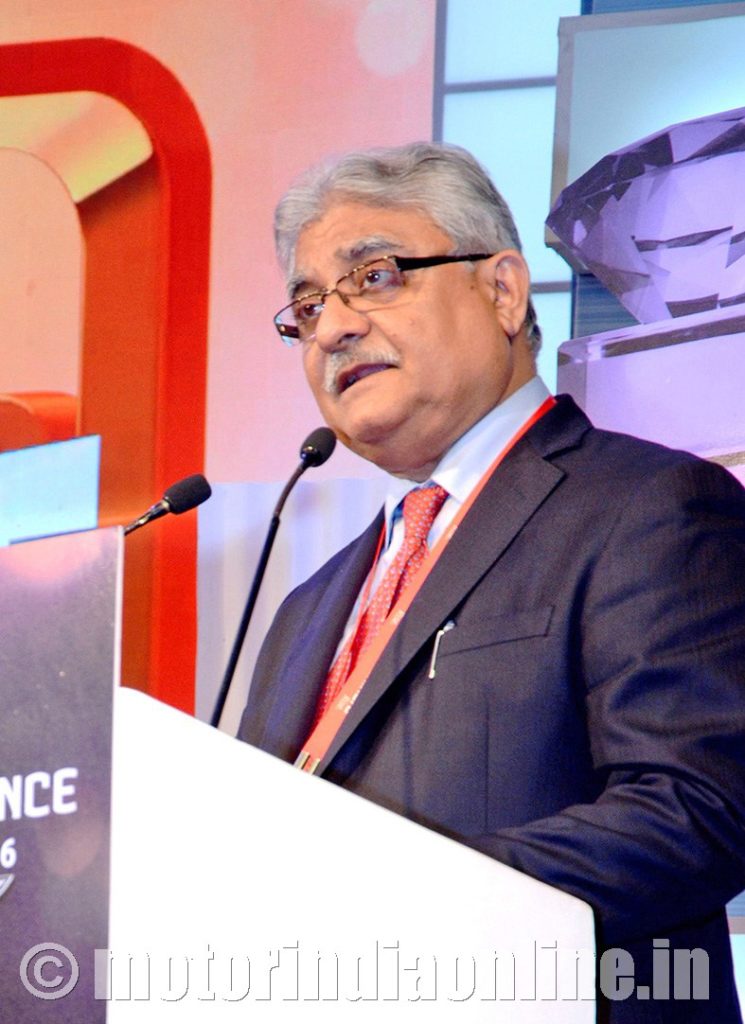The Society of Indian Automobile Manufacturers (SIAM) held its 58th Annual Convention titled “Building the Nation, Responsibly” in New Delhi on September 6. At the convention, the speakers highlighted the need for a long-term regulatory and policy roadmap for India’s auto sector and moderating the GST system as it is heading towards global transition to electric vehicle and future mobility.
Welcoming the delegates, Dr. Abhay Firodia, SIAM President, and Chairman, Force Motors, urged the Government to address the need for a long-term regulatory policy for India’s auto sector and also to moderate the GST system. He, however, stated that the GST implementation has made the taxation regime far more streamlined.

Dr. Firodia said policies changed in an ad hoc manner would create uncertainty among industry circles, and called for a 10-year policy roadmap which will give more sustainability and growth to the sector as vehicles are no more a luxury but are important for driving the economy. It’s time the Government did everything to bring down multiplicity of organizations with which the sector has to deal with. An incompatible and contradictory regulatory environment could drive away investments from the country. Vehicles are an integrated, complex machinery and are manufactured with technical regulations which are globally compatible and follow international norms.
Just four years for the transition from the BS-IV to BS-VI emissions is too short a period, and given the fact that the auto industry today is far more complex, there is need to build an ecosystem to render the transition needs gradual rathar than having a sudden disruption. He also stated that ICs are not going to roll over and die, but will continue for a decade.
Mr. Ram Venkataramani, ACMA President, and Executive Director, IP Rings, said the quality of export products has changed significantly to provide job opportunities to over 3.2 million people in India. “There is a significant room for growth. More than 60 per cent of India’s exports go to matured markets in Europe. We are committed to the 2020 BS-VI deadline, and we move ahead towards transition to autonomous, connected vehicles.”
Mr. Rakesh Bharti Mittal, CII President, and Vice Chairman, Bharti Enterprises, in his address, observed that India’s competitive weakness is struggling in design and product components in the auto sector. The sector is working on advancement of manufacturing sector technology, upskilling and reskilling workers and employment. “More has to be done for sustainability, safety, new value propositions, higher volume of software components in a car, in-depth alignment, working closely with supply chain and a new technology to be future ready.”
Dr. Rajiv Kumar, Vice Chairman, NITI Aayog, who was the Guest of Honour on the occasion, said the Indian auto sector is facing huge disruption as it moves from internal combustion (IC) engines to electric vehicles. He however insisted that the auto sector must invest more on innovation and R&D.
“Let our R&D expenditure go beyond one per cent. Modern mobility, which is connected, shared and data driven, will reduce the carbon footprint. We have to plan this transition. And this has to be carefully managed. NITI Aayog is open to new ideas and suggestions.”
He disclosed on the occasion that NITI Aayog is finalizing a framework for auto industry and is co-ordinating with the State Governments to form a task force and come out with a paper for future mobility.
Speaking at the Convention, Mr. Anant G. Geete, Union Minister of Heavy Industries and Public Enterprises, gave the assurance that the Government would soon come out with the new auto policy. He explained that no policy should be framed in a hurry and that each and every aspect of the industry should be discussed in detail with the industry before being finalised.
“We understand your concern over GST. There is no room for apprehension. While we are going through a process of change, we also have to understand the need of the consumer. The new policy will be industry, consumer and environment friendly. It is important for us to move on and change according to time. If we don’t, we will slip back. We are here to work and ensure growth of the industry”, he explained.
Mr. Geete also urged the industry to proactively involve and help reduce dependence on single technology and focus on R&D for sustainable auto sector development. At the global level, the auto industry is transitioning and moving faster than ever before, he added.

The Guest of Honour, Mr. Dharmendra Pradhan, Minister for Petroleum & Natural Gas and Skill Development & Entrepreneurship, explained the BS-VI emission norms and its benefits to the auto industry, and assured that the Government would ensure a level playing field for the industry.
Mr. Nitin Gadkari, Minister of Road Transport, Highways & Shipping, who was also a Guest of Honour, announced exemption of commercial vehicles, buses, taxis and all vehicles running on alternative fuel from the permit requirements. This would open up more businesses for the industry. Further, any two-wheeler can be run as a taxi in non-Metro cities, and this will provide large employment opportunities for young people.
He also called upon the industry to look at diversification and new economically viable businesses. He said: “You can explore water transport which will not only be economical but also provide wider scope for the auto sector growth. We are expanding roads and highways for the industry benefit from it. The Government is ensuring seamless traffic which will connect people and goods faster. More access to fast track and electronic toll plaza is being given. We are also cancelling speed governors. We don’t need them as we are developing good roads. There is no need to limit the speed artificially.”
The industry must ensure better models and engines and produce high-performance vehicles. “Our Government has given priority for development of bio-fuel. Our price-centric mentality needs to be cost and comfort centric,” he added.
Concluding the session, Mr. Rajan Wadhera, SIAM Vice President, and President – Automotive Sector, Mahindra & Mahindra, stated that India’s auto sector has grown in size and stature and has plans to create 65 million additional jobs. Though facing massive challenges, it is working hard with different stakeholders and the Government to ensure sustainability and growth.
M&M’s Rajan Wadhera elected SIAM President

SIAM has elected Mr. Rajan Wadhera, President – Automotive Sector, Mahindra & Mahindra, as its new President, Mr. Kenichi Ayukawa, Managing Director & CEO, Maruti Suzuki India, as its Vice President, and Mr. Vinod Aggarwal, MD & CEO, Volvo Eicher Commercial Vehicles (VECV), as its Treasurer.